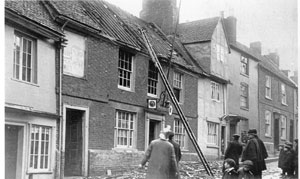
UNIONIST CLUB FIRE
26TH DECEMBER 1912
TAKEN FROM THE BUCKS STANDERD
28TH DECEMBER 1912
<<BACK

The fire broke out, it is believed, through the over-heating of a beam which runs under the fireplace in one of the upper rooms facing St. John-Street. The club premise are some of the oldest in the town, and in this as in the neighbouring houses, wooden supports are said to be quite common under the fire grates. As to the outbreak originated is a matter for conjecture. There was only a small fire in this particular room-the reading room-on Xmas Day, and when the steward (Mr. Geo. Tandy) and members of the committee of management made an inspection of the place before closing the club the previous night, there was no evidence of anything unusual. There was no small fire and everything seemed in perfect order and quite safe. Probably the wooden beam had been smouldering for some days. The reading room and the games room adjoining were totally wrecked, and the secretarys office on the ground floor was burnt out. Fortunately Messrs.C Bavington and Tom Clarke succeeded in rescuing many of the books and documents which relate to the business of the club, but several billiard cues - the private property of some of the members and two rifles used on the miniature range just erected at the back of the club were destroyed. There was a fear at one time that the fire would extend to the concert hall, but happily the brigade; whose work was highly commendable throughout, confined the outbreak to a limited circle, and the bar, billiard room, concert hall, and the buffet on the right of the entrance hall all escaped serious damage and enabled the business of the club to proceed throughout the day without any particularly noticeable inconvenience.
The fire was extinguished in well under an hour. One line of hose was taken through Mr.W.J. Powells garden and played on to the secretarys office; two more lines were used on the front of the building, and later the hoses were carried through the club passage and effectively operated on the room on the ground floor which had came within the grip of the outbreak. Though rain fell heavily the whole time hundreds of people assembled in the vicinity of the club, and the splendid and smooth working of the new steam fire engine was spoken of most highly, whilst the smart and business-like manner in which the brigade acted throughout the worthy of the greatest praise.
The damage was very considerable, and will necessitate the whole front of the club being re-built. The premises are fully insured with the Royal Insurance Company, the local agent for which is Mr.C.J. Saunders, of the Bank House.